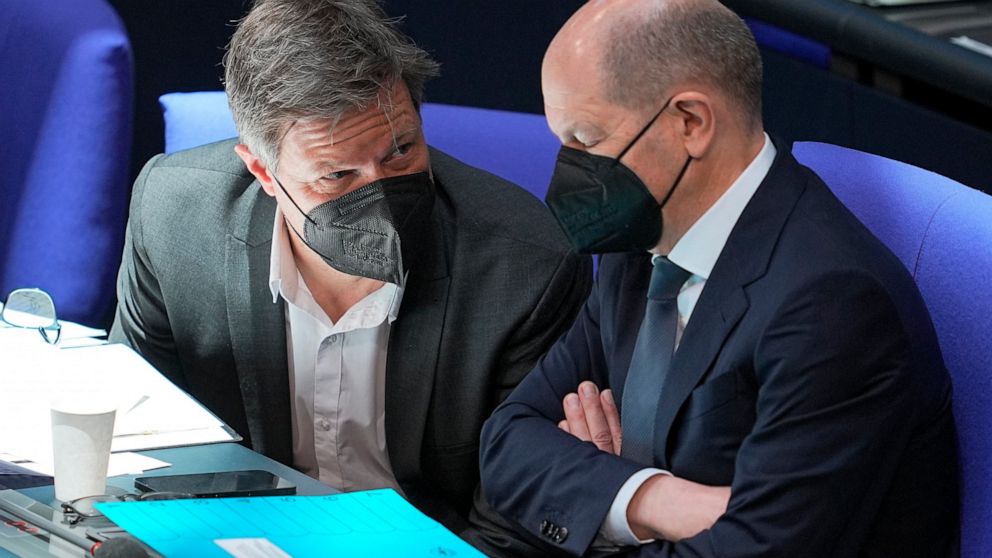The Group of Seven major economies agreed on Monday to reject Moscow’s request to pay for Russian natural gas exports in rubles.
German Energy Minister Robert Habeck told reporters that “all G7 ministers fully agreed that this (would be) a clear unilateral violation of existing contracts” for natural gas, which is used to heat homes, generate electricity and power industry. .
The energy ministers of France, Germany, Italy, Japan, the United States, the United Kingdom and Canada, as well as the European Union Energy Commissioner, met by video link and reaffirmed that contracts “must be respected,” with most payments stipulating that euros or dollars, a statement from the group said. The seven.
“Paying in rubles is not acceptable, and we will urge the affected companies not to follow the request of (Russian President Vladimir) Putin,” said Habek.
Putin announced last week that Russia will require “unfriendly” countries to pay for natural gas only in Russian currency from now on, and instructed the Central Bank to establish a procedure for buyers to get the ruble in Russia. Demand has driven up already high gas prices. Amid fears that it could be a prelude to a natural gas shutdown, which could disrupt Europe’s economy and hurt Russia’s finances.
Economists said the move appeared to be aimed at trying to prop up the ruble, which has collapsed against other currencies since Putin invaded Ukraine on February 24, and Western countries responded with far-reaching sanctions against Moscow. But some analysts expressed doubts about its success.
Asked by reporters earlier on Monday whether Russia could cut off natural gas supplies to European customers if they refused the ruble payment request, Kremlin spokesman Dmitry Peskov said in a conference call, “It is clear that we will not provide gas for free.”
“In our case, it is hardly possible and feasible to work in philanthropy for Europe,” Peskov said.
Asked what would happen if Russia turned off the taps now, Germany’s energy minister said, “We are ready for all scenarios.”
“Putin asked to convert contracts into rubles (meaning) that he stands with his back to the wall in this regard, otherwise he would not have made this request,” Habek said, adding that Russia needs the ruble to finance its war at home. , such as payments to troops.
European governments have shied away from imposing a ban on energy imports from Russia due to concerns about the impact on the economy. Europe gets 40% of its gas and 25% of its oil from Russia, and since the war it has been quick to come up with proposals to reduce its dependence. Russia is equally dependent on Europe, where its oil and gas sector dominates and pays for government costs.
Estimates of the impact of a gas boycott or embargo on Europe vary, but most involve a significant loss of economic output, especially as the war and the resulting rise in energy and raw materials prices are already weighing on the European economy. US sanctions allow exceptions for oil and gas payments, although they have banned imports of Russian energy itself.
Putin’s proposal to pay in rubles prompted the German utility association, BDEW, to call on the government to declare an “early warning” of an energy emergency.
On Monday, a spokeswoman said the government did not see the need for an early warning at this time.
“The contracts we know put the euro as the payment currency and the companies will pay according to the contracts they signed,” German Chancellor Olaf Scholz said when pressed by reporters when presenting the announcement.
The currency used to buy Russian energy “doesn’t really matter,” said Robin Brooks, chief economist at the Institute of International Finance, a trade group for the world’s banks.
“What matters is that energy exports give Russia purchasing power that it can convert into goods from abroad,” she said.
Putin’s request to pay in rubles “is mostly window decoration. It doesn’t change the underlying transactions,” Brooks said. “On the sidelines, I would call this another ‘special goal’ for Putin, as it increases the focus on gas purchases by Western Europe and could increase the odds of Cessation of import.
———
Associated Press economic writer Paul Wiseman contributed from Washington.

“Writer. Evil travel maven. Avid creator. Proud beer expert. Music lover. Explorer.”











More Stories
Jake Sullivan meets Yang Jiechi in Luxembourg, paving the way for a possible meeting between Biden and Xi
The CDC adds 3 places to its “high” risk list, including Mexico and the United Arab Emirates
Wordle 359 June 13 – Struggling with Wordle today? THREE CLUES TO HELP ANSWER | Games | entertainment